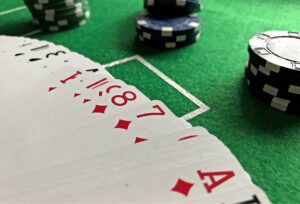Understanding the Live Poker Dealer: Signals and Roles
In live poker games, the dealer plays a crucial role in facilitating the game and ensuring fair play. This article aims to provide an introduction to understanding the live poker dealer, focusing on their signals and roles during gameplay. By familiarizing oneself with these aspects, players can enhance their overall poker experience and make informed decisions at the table.
The Importance of Understanding Live Poker Dealer Signals
In the world of poker, there is a crucial player who often goes unnoticed – the live poker dealer. While players focus on their hands and strategies, it’s important to understand the signals and roles of these dealers, as they play a vital role in ensuring fair gameplay and an enjoyable experience for all.
One of the primary reasons why understanding live poker dealer signals is essential is because they act as intermediaries between the players and the casino. They are responsible for dealing the cards, managing the pot, and enforcing the rules. By paying attention to their signals, players can stay informed about the progress of the game and any changes that may occur.
The first signal that every player should be familiar with is when the dealer shuffles the deck. This action signifies the start of a new round and ensures that the cards are randomized. It’s important for players to observe this process closely to ensure fairness in the game. Additionally, players should pay attention to how the dealer distributes the cards, making sure they are dealt face down and in a consistent manner to maintain the integrity of the game.
Another significant signal from the live poker dealer is when they announce the betting rounds. These announcements indicate when players can place their bets or make other actions such as folding or raising. By listening carefully to the dealer’s instructions, players can avoid confusion and ensure that their actions align with the established rules of the game.
Furthermore, live poker dealers also play a critical role in resolving disputes that may arise during gameplay. If there is any disagreement or misunderstanding among the players, it is the dealer’s responsibility to intervene and find a resolution. Their impartiality and knowledge of the rules make them invaluable in maintaining a fair and orderly gaming environment.
Aside from understanding the signals, it’s also essential to recognize the various roles that live poker dealers fulfill. Firstly, they act as facilitators, ensuring that the game runs smoothly by keeping track of the action, collecting bets, and distributing winnings. Their ability to multitask efficiently is crucial in maintaining the flow of the game.
Secondly, live poker dealers serve as educators. They are responsible for explaining the rules to new players and answering any questions that may arise during the game. This role requires patience and a thorough understanding of the game’s intricacies, ensuring that all participants can enjoy a level playing field.
Lastly, live poker dealers act as ambassadors for the casino or poker room they represent. They contribute significantly to the overall atmosphere by fostering a friendly and welcoming environment. Their professionalism and interpersonal skills make them an integral part of the gaming experience, leaving a lasting impression on players.
In conclusion, understanding the signals and roles of live poker dealers is vital for every player. By paying attention to their signals, players can stay informed about the progress of the game and ensure fairness. Additionally, recognizing the various roles that these dealers fulfill helps create a positive gaming environment. So, next time you sit down at a poker table, remember to appreciate and respect the invaluable contribution of the live poker dealer.
Roles and Responsibilities of a Live Poker Dealer: A Comprehensive Guide
When it comes to playing poker, the dealer is a crucial component of the game. Not only do they facilitate the flow of play, but they also ensure fairness and accuracy in the distribution of cards. In live poker games, where players are physically present at a casino or poker room, the role of the dealer becomes even more important.
The primary responsibility of a live poker dealer is to shuffle and deal the cards. However, their role extends far beyond that. A good dealer must possess excellent communication skills and be able to effectively manage the table. They must maintain control over the game, ensuring that all rules are followed and that players act in turn.
One of the key responsibilities of a live poker dealer is to announce the action at the table. This includes stating the size of bets and raises, as well as declaring when a hand has reached its conclusion. By doing so, the dealer keeps all players informed and ensures transparency in the game.
In addition to announcing the action, the dealer is also responsible for collecting and distributing chips. When a player wins a pot, the dealer must accurately calculate the amount won and provide the appropriate payout. Likewise, when a player wants to buy more chips, the dealer must handle the transaction smoothly and efficiently.
Another important role of the live poker dealer is to enforce the rules of the game. They must be knowledgeable about the specific rules and regulations of the casino or poker room in which they work. This includes knowing how to handle situations such as string bets, misdeals, and disputes between players.
Furthermore, the dealer acts as a mediator between players, resolving conflicts and maintaining a harmonious atmosphere at the table. They must remain impartial and make decisions based on the best interest of the game.
To fulfill these various roles and responsibilities, live poker dealers often use a set of signals and gestures to communicate with players. For example, when a player wants to fold their hand, they may simply push their cards towards the dealer. The dealer then acknowledges this by sweeping the cards into the muck pile.
Similarly, when a player wants to make a bet or raise, they may place their chips in front of them and tap the table. The dealer recognizes this as an indication of action and announces the bet accordingly.
These signals and gestures are crucial for maintaining efficiency at the poker table. By using them, the dealer can quickly understand and respond to the actions of the players, keeping the game running smoothly.
In conclusion, the role of a live poker dealer goes far beyond simply shuffling and dealing cards. They are responsible for managing the table, enforcing rules, and ensuring fair play. Through their use of signals and gestures, they communicate with players and keep the game flowing seamlessly. Without a skilled and competent dealer, the integrity of the game would be compromised. So next time you sit down at a live poker table, take a moment to appreciate the hard work and dedication of the dealer who keeps the game running smoothly.
How to Interpret Live Poker Dealer Signals for Better Gameplay
Understanding the Live Poker Dealer: Signals and Roles
Poker is a game that has captivated players for centuries, with its blend of strategy, skill, and luck. While many people are familiar with online poker, there is something special about playing in a live setting. In live poker games, one important figure stands at the center of it all – the dealer. The dealer not only ensures the smooth running of the game but also provides subtle signals that can give astute players an edge.
When you sit down at a live poker table, the first thing you’ll notice is the presence of a professional dealer. Their role goes far beyond simply shuffling cards and distributing them to the players. A skilled dealer acts as the facilitator of the game, creating an environment that allows players to focus on their strategies without any distractions.
One crucial aspect of a live poker dealer’s job is to maintain order and fairness throughout the game. They ensure that every player receives their cards in a random and unbiased manner. This responsibility extends to managing the pot, overseeing betting rounds, and settling disputes that may arise during gameplay. Without a competent dealer, the game would quickly descend into chaos.
But what sets a great live poker dealer apart from a good one? It’s their ability to communicate through subtle signals. These signals can provide valuable insights into the flow of the game, allowing attentive players to make more informed decisions. However, it’s important to note that not all dealers use signals, and those who do might have their own unique ways of conveying information.
One common signal used by dealers is their body language. Skilled dealers often convey information through their facial expressions, hand movements, or even the way they hold the deck of cards. For example, a slight change in their expression might indicate that a strong hand is coming up, while a quick glance towards a particular player could suggest that they have a weak hand.
Another way dealers communicate is through their speed of dealing. By observing how fast or slow a dealer distributes the cards, players can gain insights into the strength of their opponents’ hands. A rapid deal might indicate a weak hand, as the player wants to get rid of their cards quickly, while a deliberate and measured deal could suggest confidence in a strong hand.
In addition to body language and dealing speed, dealers may also use verbal cues to convey information. They might subtly emphasize certain words or phrases during the game, providing hints about the strength of the current hand or the intentions of other players. These verbal signals require attentive listening skills from players who want to pick up on them.
However, it’s important to remember that relying solely on dealer signals is not foolproof. Dealers are professionals who understand the importance of maintaining neutrality and fairness. While they may provide subtle hints, their primary responsibility is to ensure the integrity of the game. Therefore, players should view these signals as additional tools rather than definitive indicators.
In conclusion, live poker dealers play a vital role in creating an enjoyable and fair gaming environment. Their ability to communicate through signals adds an extra layer of excitement and strategy to the game. By paying attention to their body language, dealing speed, and verbal cues, astute players can gain valuable insights that may lead to better gameplay decisions. However, it’s crucial to remember that these signals should be used as supplements to traditional strategies, rather than relied upon exclusively. So next time you sit down at a live poker table, keep your eyes peeled for those subtle dealer signals – they just might give you the edge you need.
Enhancing Your Strategy by Decoding Live Poker Dealer Signals
In the world of poker, every player knows that understanding the live poker dealer can give them a significant advantage. While many players focus solely on their opponents’ moves and strategies, deciphering the signals and roles of the dealer can provide valuable insights into the game.
The live poker dealer plays a crucial role in ensuring a fair and smooth game. They are responsible for shuffling and dealing the cards, managing the pot, and enforcing the rules. However, their job goes beyond these basic responsibilities. Skilled dealers possess a wealth of information that can be gleaned through their actions and demeanor.
One important signal to look out for is the speed at which the dealer shuffles and deals the cards. A fast-paced dealer might indicate a desire to keep the action flowing, while a slower dealer could suggest a more deliberate approach. By paying attention to this subtle cue, players can adjust their strategy accordingly. For example, if the dealer is quick, it may be wise to play more aggressively, whereas a slower dealer may call for a more cautious approach.
Another aspect to consider is the dealer’s body language. Experienced players understand that non-verbal cues can reveal a lot about an opponent’s hand. The same principle applies to the dealer. Observing their facial expressions, hand movements, and overall demeanor can offer valuable clues about the strength of the cards being dealt. A slight smile or raised eyebrow could hint at a strong hand, while a frown or nervous twitch might indicate a weaker one.
Furthermore, the dealer’s interaction with the players can also provide useful information. Paying attention to how they engage with each player, the tone of their voice, and the level of eye contact can all contribute to understanding their intentions. A friendly and talkative dealer may try to create a relaxed atmosphere, potentially indicating a desire to encourage more betting. On the other hand, a more serious and reserved dealer may aim to maintain a sense of professionalism, possibly signaling a tighter game.
It is important to note that not all dealers will exhibit the same signals or have the same intentions. Each dealer has their own unique style and personality, which can affect how they handle the cards and interact with players. Therefore, it is essential for players to observe multiple games and dealers before drawing any conclusions.
Decoding live poker dealer signals is not about reading minds or predicting every card that will be dealt. It is about gathering as much information as possible to make more informed decisions. By paying attention to the speed of dealing, body language, and interaction with players, players can gain a deeper understanding of the game’s dynamics.
In conclusion, understanding the live poker dealer and decoding their signals can greatly enhance a player’s strategy. By observing the speed at which cards are shuffled and dealt, analyzing the dealer’s body language, and noting their interactions with players, valuable insights can be gained. However, it is crucial to remember that each dealer is unique, so careful observation over multiple games is necessary. With this knowledge in hand, players can take their poker skills to new heights and increase their chances of success at the table.
Mastering Live Poker Dealer Signals: Tips and Tricks for Success
Understanding the Live Poker Dealer: Signals and Roles
In the world of poker, a live dealer plays a crucial role in ensuring a fair and smooth gameplay experience. While many players focus solely on their own strategies and decisions, it is important to also pay attention to the signals and roles of the dealer. By understanding these aspects, players can gain valuable insights into the game and improve their chances of success.
One of the primary roles of a live poker dealer is to shuffle and deal the cards. This may seem like a simple task, but it requires precision and skill. Dealers must ensure that the deck is properly shuffled to randomize the order of the cards. They must also deal the cards in a consistent manner, avoiding any potential biases or favoritism.
To accomplish this, dealers often employ various signals during the shuffling and dealing process. These signals are subtle movements or gestures that convey specific information to the players. For example, a dealer may use a particular hand motion to indicate that the deck is being shuffled. Similarly, they may use another gesture to signal the start of a new round or the end of betting.
While some signals are standardized across casinos, others may vary depending on the establishment or even the individual dealer. It is therefore important for players to pay close attention and familiarize themselves with the specific signals used at their table. This can help them stay informed about the progress of the game and make better-informed decisions.
Furthermore, observing the signals of the dealer can provide valuable insights into the strength of other players’ hands. Skilled dealers often have subtle tells or unintentional behaviors that can inadvertently reveal information about the cards they are dealing. By carefully watching for these cues, astute players can gain an edge by deducing which cards are likely to be in play.
However, it is important to note that not all dealers exhibit these tells, and relying solely on such observations can be risky. The primary responsibility of a dealer is to maintain the integrity of the game, and any deliberate attempts to manipulate or provide unfair advantages to players would be highly unethical and against the rules.
In addition to shuffling and dealing cards, live poker dealers also play a crucial role in managing the flow of the game. They are responsible for ensuring that each player acts in turn, enforcing betting limits, and resolving any disputes or rule violations that may arise. This requires strong communication skills and a deep understanding of the game’s rules and procedures.
To facilitate this, dealers often use verbal signals to communicate with the players. They may announce the start and end of betting rounds, clarify the value of bets, or indicate when it is a player’s turn to act. By listening carefully to these verbal cues, players can stay engaged and avoid any misunderstandings that could impact their gameplay.
In conclusion, understanding the signals and roles of a live poker dealer is essential for any serious player. By paying attention to the subtle gestures and movements of the dealer, players can gain valuable insights into the game and improve their chances of success. However, it is important to remember that relying solely on these observations is not foolproof, and ultimately, a successful poker player must rely on their own skills, strategies, and decision-making abilities.In conclusion, understanding the live poker dealer’s signals and roles is crucial for players to have a fair and enjoyable gaming experience. The dealer serves as the central figure in the game, responsible for managing the cards, enforcing rules, and facilitating the flow of the game. By familiarizing themselves with the various signals used by the dealer, players can effectively communicate their actions and intentions during gameplay. Additionally, being aware of the roles played by the dealer, such as shuffling and distributing cards, helps players understand the dynamics of the game better. Overall, comprehending the live poker dealer’s signals and roles enhances players’ ability to participate actively and make informed decisions during poker sessions.




